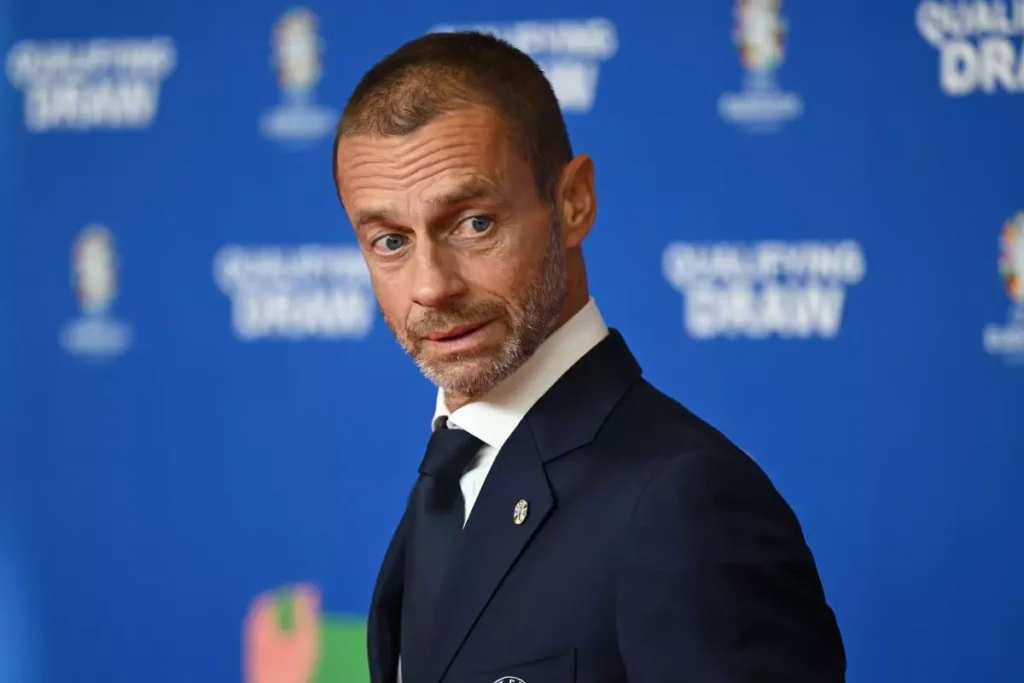Behind the glitz and glamour of the last Champions League final, football’s most influential figures were quietly plotting what could become the biggest political shake-up in European football history.

Whilst millions watched the on-pitch drama unfold in Munich, the real action was happening away from the cameras in the city’s most exclusive hotels. Senior football figures have begun forming an underground resistance movement aimed at challenging UEFA president Aleksander Ceferin when his term comes up for renewal in 2027.
The plot reads like something from a political thriller, complete with whispered conversations in five-star hotel corners and legendary players being courted as potential presidential candidates.
When Legends Become Revolutionaries
Ukrainian icon Andriy Shevchenko has emerged as the frontrunner to lead this football revolution, though sources suggest even former France captain Michel Platini’s name has been floated in certain circles.
The choice of a beloved football legend isn’t accidental. These veteran political operators understand that challenging an established president requires someone with both credibility and star power – qualities that Shevchenko possesses in abundance.
The former AC Milan striker’s potential candidacy represents more than just a change of leadership; it symbolises a desire to return power to football’s traditional stakeholders rather than corporate boardrooms.
The PSG Power Play
Much of the frustration centres around the growing influence of Paris Saint-Germain president Nasser Al-Khelaifi, whose relationship with Ceferin has fundamentally altered European football’s power structure.
The symbolism wasn’t lost on anyone when Ceferin personally handed the Champions League trophy to PSG representatives, with warm embraces shared between the UEFA chief and his close friend Al-Khelaifi. For many observers, it perfectly captured how intertwined their relationship has become.
Al-Khelaifi’s rise through football’s political ranks has been nothing short of remarkable. From PSG president to chairman of the powerful European Club Association (ECA), he now wields influence that many believe rivals traditional football governing bodies.
The ECA’s joint operation of the Champions League with UEFA has essentially given elite clubs exactly what they wanted through the failed Super League project – just through official channels rather than rebellion.
The Balkan Bloc’s Grip on Power
Ceferin’s political strength comes from a loyal group of 14 countries, many from his native Balkans region. This voting bloc has effectively controlled UEFA’s agenda, leaving other national associations feeling increasingly marginalised.
Many federation officials complain they can’t even get serious debates about crucial football matters onto the agenda, let alone influence major decisions. The frustration has reached boiling point among representatives who feel their voices are being systematically ignored.
This democratic deficit has created the perfect breeding ground for opposition movements, with national associations across Europe quietly expressing support for change.
The Paraguay Fiasco
The rebellion gained serious momentum following a diplomatic disaster in Paraguay last month. FIFA president Gianni Infantino’s decision to extend his stay in Saudi Arabia with Donald Trump rather than attend his own Congress on time sparked outrage among European delegates.
Ceferin led a dramatic walkout of European representatives and issued a blistering statement criticising Infantino for pursuing “private political interests.” The move initially energised opposition groups and even caught the attention of senior EU officials concerned about football governance.
However, the momentum evaporated within days when UEFA released a follow-up statement claiming the episode was “isolated” and praising their “ongoing collaboration” with FIFA. The rapid backtrack left many questioning Ceferin’s political resolve and consistency.
England’s Delicate Balancing Act
The Football Association finds itself in a particularly tricky position. CEO Mark Bullingham was the only federation leader brave enough to vote against controversial reforms allowing Ceferin to stand again in 2027, whilst former UEFA treasurer David Gill has clashed publicly with the Slovenian president over governance issues.
Yet England’s upcoming hosting duties for Euro 2028 and the Women’s World Cup in 2031 require maintaining good relationships with football’s power brokers. The FA appears to be carefully playing both sides, supporting reform whilst avoiding direct confrontation.
The Lakovic Factor
Behind-the-scenes manoeuvring has seen Ceferin loyalist Zoran Lakovic appointed to the crucial role of deputy general secretary. The Serbian’s rapid accumulation of power within UEFA has made him Ceferin’s “man on the ground,” effectively controlling day-to-day operations.
With long-serving UEFA grandee Theodore Theodoridis expected to retire soon, Lakovic’s influence will only grow, further cementing Ceferin’s control over the organisation’s machinery.
The 2027 Chess Game Begins
The next two years promise to be fascinating for football politics. Ceferin’s own intentions remain deliberately vague – he previously suggested stepping down in 2024 before quickly reversing course with ambiguous language that left all options open.
What’s certain is that opposition forces are now organising with serious intent. The Munich meetings represent just the beginning of what could become a sustained campaign to reshape European football’s leadership.
Whether they can overcome Ceferin’s established political machine remains to be seen, but the mere existence of organised opposition suggests European football’s political landscape is entering its most turbulent period in years.
The beautiful game’s future direction may well be decided not on the pitch, but in the corridors of power where these legendary figures are now making their moves.

